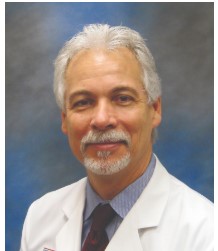Freeman Heart & Vascular Institutes celebrates 30 years

JOPLIN, Mo. – Freeman Interventional Cardiologist Dr. John Cox – founder of Freeman Heart & Vascular Institute – can still remember details about the very first heart catheterization procedure he successfully completed back in the early 1990s.
This year, 2024, marks the 30th anniversary of Freeman Health System’s heart program.
“We have grown tremendously,” Dr. Cox said during a media event held on Dec. 20. “We went from a mobile lab that got us off the ground, to a lab that allowed us to do some diagnostic procedures, and then some months later we were able to do our first cardiac surgeries.”
The Freeman Heart & Vascular Institute now operates four catheterization labs.
“The hearts program has been an innovator in this region, and we were the first to do a lot of procedures,” Dr. Cox said. “I had a vision of what heart care in Joplin, Missouri could be and I’m very proud of what we’ve built here.”
One hundred and ten cases were successfully performed in the program’s first year. In 2023 alone, Freeman completed 4,300 procedures. In the early 1990s, it took Dr. Cox and his team of cardiovascular technologists a full day to perform just five cases. In 2024, five cases can be completed in roughly two hours.
“We started with four people. Now, we’re up to about 18 to 20, not including the cardiologists. We do multiple different procedures. Back then, it was one procedure—diagnostic. Now we do interventions. We work on a lot of different parts of the body, not just the heart,” said Elizabeth Baum, Freeman cardiovascular technician.
Advances in technology is one of the primary reasons why heart procedures at Freeman have increased exponentially over time. Initially, there was often a pause between diagnostic heart procedures – gathering information to diagnose a heart condition – and therapeutic procedures – actively going about treating the diagnosed heart problem.
Dr. Cox said he would often take pictures of the patient’s heart and chest, develop the film and then study the images, sometimes rewinding them time and time again, before deciding how to properly tackle a problem.
Today Dr. Cox has access to virtually instant replay of very detailed heart images.
“The ability to save a patient, who otherwise would have died 30 years ago, who can now walk out the door, is a tremendous change,” Dr. Cox said. “We started this program from scratch, and so there were stresses and challenges involved with trying to make that heavy lift. But luckily, we had a very supportive staff and a very supportive administration, and we were able to build on that.
“I’m at the end of my career and to look back on this and know that we’ve built something that has saved so many people’s lives, I’m certainly grateful for that,” Dr. Cox said.



